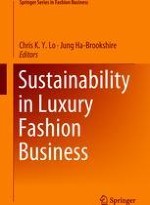2018 | OriginalPaper | Buchkapitel
5. Thematic Analysis of YouTube Comments on Disclosure of Animal Cruelty in a Luxury Fashion Supply Chain
verfasst von : Heejin Lim
Erschienen in: Sustainability in Luxury Fashion Business
Verlag: Springer Singapore
Aktivieren Sie unsere intelligente Suche, um passende Fachinhalte oder Patente zu finden.
Wählen Sie Textabschnitte aus um mit Künstlicher Intelligenz passenden Patente zu finden. powered by
Markieren Sie Textabschnitte, um KI-gestützt weitere passende Inhalte zu finden. powered by
